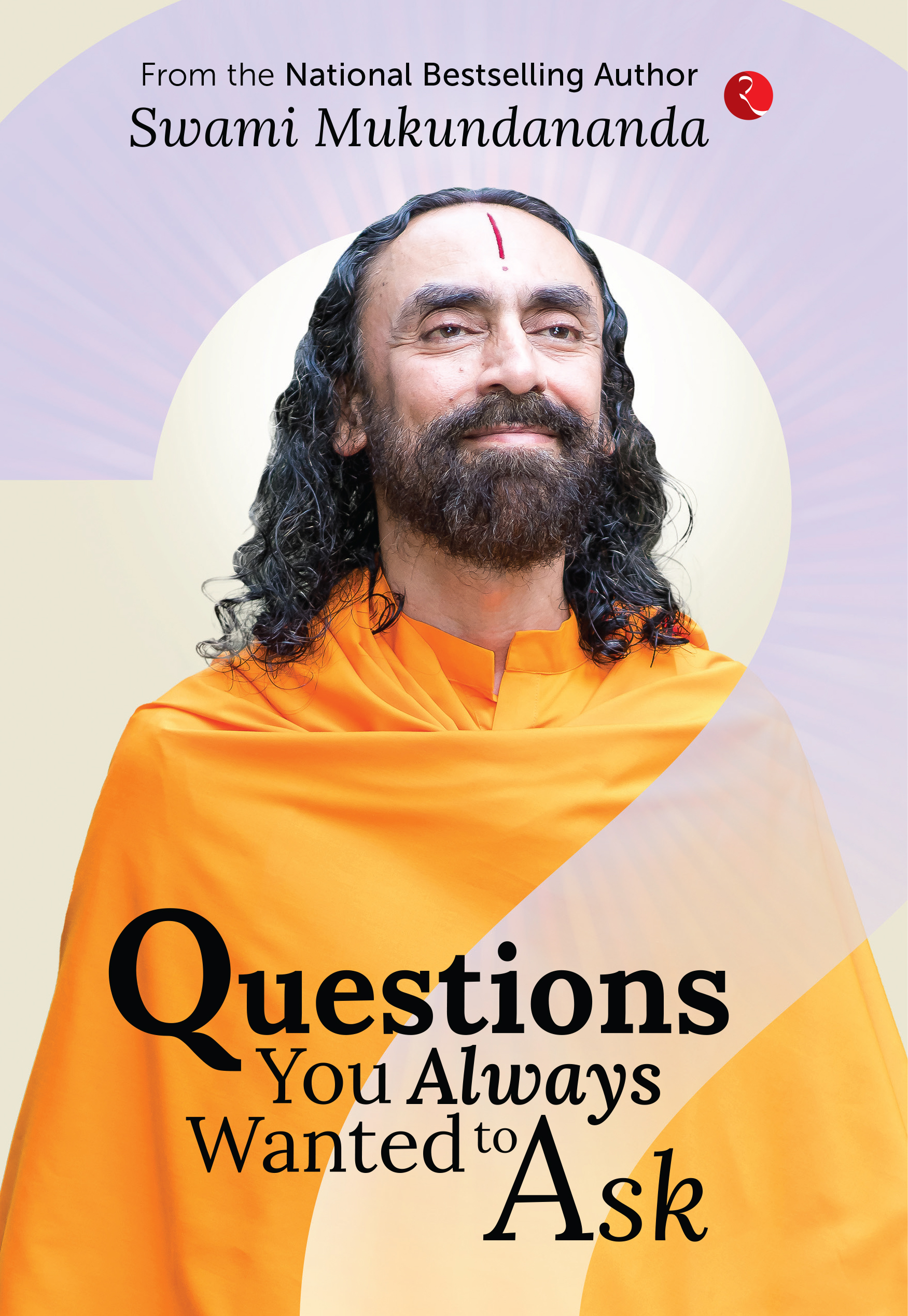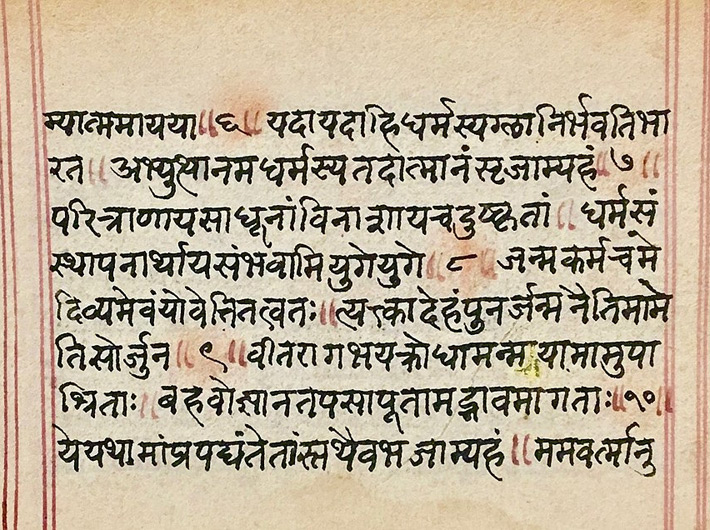Swami Mukundananda shows the way in this excerpt from his new book, ‘Questions You Always Wanted to Ask’
Questions You Always Wanted to Ask
By Swami Mukundananda
Rupa Publications, 216 pages, Rs 295

All of us seek knowledge and wisdom that will unlock new doors and possibilities, eventually leading us to a happier and better life. This process often leads us to ask the big questions: ‘Who am I?’, ‘What is the purpose of life?’, ‘What is true happiness?’, ‘How can we alleviate suffering?’, and so forth. While we find some viable explanations, many questions still linger in our minds or even hold us in a gridlock, making us feel stuck. The dialectic process of question and answer when done under the guidance of a Spiritual Master clears our doubts and helps develop new ideas about the world around us.
In this book, Swami Mukundananda, an IIT Delhi and IIM Calcutta alumnus, bestselling author, bhakti Saint and an international authority on mind management, delves into the Vedas and other holy scriptures to answer some of the most popular questions related not only to spirituality, philosophy, rituals and devotion, but also those related to mind management, life’s dilemmas, professional mastery and self-transformation. Swamiji’s answers provide easy access to gain a deeper understanding of life, uncover new ideas that will expand your horizons, and acquire wisdom to solve your personal problems and dilemmas.
‘Questions You Always Wanted to Ask’ is your easy access to knowledge that would otherwise be gained by sifting through endless piles of information, wading through much confusion, or learning from the ‘University of Hard Knocks’. Ask Swamiji and find your way to a purposeful, successful and effective life.
Swami Mukundananda is a world-renowned spiritual teacher from India, an international authority on mind management and a bestselling author. He earned his degrees from the prestigious IIT Delhi and IIM Calcutta, but chose to enter monkhood, renouncing a promising corporate career. He studied the Vedic scriptures at the feet of Jagadguru Kripaluji Maharaj. For almost four decades now, he has been sharing his vast knowledge through his books, lectures, and life transformation programs.
Everyday Swamiji meets hundreds, and even thousands, of people from all walks of life. His steadfast positivity exudes hope, clarity and sense of purpose to those who connect with him. He has deeply affected the lives of millions of people who have been drawn by his profound integrity, charismatic personality and passion to serve. Despite his busy schedule, those who encounter him experience his genuinely caring and compassionate personality and feel deeply touched by him. Swamiji’s lectures are humorous, his arguments are logical and well laid-out, and most of all, his advice is practical. His lectures on social media platforms are loved and followed by millions. Swamiji divides his time between India and the US.
Here is an excerpt from ‘Questions You Always Wanted to Ask’:
BALANCING PROFESSIONAL AND MATERIAL LIFE
Question: How do we balance our time-intensive academic and professional obligations with spiritual pursuits?
Answer: Let us take inspiration from elevated saints in history. Did you know that many of them were also great kings, generals, musicians, and writers? Parikshit, Prahalad, Ambarish, Prithu, and Janak were some of the greatest Saints mentioned in the scriptures. Yet, they were also exemplary kings—perfect in their profession, which entailed administration of a large kingdom.
Dhruv Maharaj was a devotee of God from childhood and went on to rule a vast nation. As a monarch, he flawlessly fulfilled his obligations towards his citizens, and yet, was also perfectly spiritual.
Yudhishthir, another great devotee and king, fought one of the most terrifying wars in history. Imagine how much more complex his situation would have been. If Yudhishthir could engage in bhakti on a battlefield, then surely we can incorporate it into our life as well.
No wonder Shree Krishna chose the setting of a battle to impart the timeless wisdom of the Bhagavad Gita. He conveyed the strong message that spirituality can be practised along with time-intensive occupations. The technique Shree Krishna taught is called ‘Karm Yog’. Let us see what it is.
Presently, while working, our mind does not remain equipoised. We harbour anger, fear, stress, tension, anxiety, and innumerable other thoughts and sentiments. This is the antithesis of the state of yog. The Bhagavad Gita guides one to be in yog even while working. ‘Yog’ means ‘union of the consciousness’. When our consciousness is filled with loving devotional thoughts of God, it is called yog. And if we can retain such consciousness even while working, it becomes karm yog.
Karm yog is basically karm (action) plus yog (mind attached to God), meaning, ‘Do your worldly works with your body while keeping the mind in God at all times.’ The second part of this instruction is difficult—to always keep the mind on the Divine. Many of us do remember God when we do pooja in the morning, but after the pooja is over, we forget Him for the rest of the day. We must now try to remember the Lord at all times. How?
Practise feeling the presence of God. Throughout our waking state, we constantly perceive ourselves, ‘I am eating, I am walking, I am thinking, I am speaking, etc.’ We are conscious of ‘I am’ but forget to realize ‘God is also with me’.
We must now add this perception to our consciousness: ‘I am not alone. My Soul-Beloved is always accompanying me. He is my Witness and Protector.’ In fact, God is everywhere and all-pervading, but we have forgotten to realize His presence. Now we need to make space for Him in our awareness and practise realizing His constant presence with us.
How to perceive God’s presence while working. Let us say, you go to your office and sit on your chair in the morning. Take a pause before you start work. First, make God sit on an empty chair in one corner of the room. Think, ‘Shree Krishna is watching me. All I am doing is for His pleasure and in His service.’ Now, begin your work.
Since we are not yet accomplished, it is natural that as we get engrossed in our work, God will slip out of our mind. Never mind. After an hour, stop work, and think, ‘God is watching me. He is saying, “Aay…you were supposed to keep your mind in Me. What have you started thinking?”’ In this way, our consciousness that had slipped will again be uplifted. The stream of poor thoughts that had begun flowing in our mind will stop.
We must keep practising in this manner after every hour. Once we have established the practice at intervals of one hour, then increase the frequency to every half hour. When that is achieved, increase the frequency further to intervals of 15 minutes. With constant practice, we will reach a stage where we continuously feel the presence of God with us.
sarveṣhu kāleṣhu mām anusmara yudhya cha
(Bhagavad Gita verse 8.7)
Shree Krishna tells Arjun to continue fighting the righteous war because, as a warrior, it is his duty. But along with it, he should also strive to remember God at all times. Simply put, karm yog can be described as ‘mind in God, body at work.’
The technique of karm yog bestows many benefits.
First, we see ourselves as fragments of the Divine. Such an attitude allows us to develop a healthy self-identity, not based on ego or who people think we are, but on the reality of our soul. We maintain humility without being self-demeaning.
Second, we see our work as service to the Divine. The work becomes not drudgery to go through, but a joy to perform. Since our work is for the pleasure of God, we exert ourselves with a positive attitude and to the best of our ability.
Third, since the results of our efforts are for the pleasure of the Supreme, we are not attached to them. If we do not get the desired results despite our best exertions, we think, ‘Probably, it was not the will of the Lord. Let me submit to His wish and be happy.’ This sense of detachment frees us from stress, anxiety, tension, and fear.
Fourth, we view everyone with whom we interact as divine fragments of God and consequently maintain a healthy attitude towards them. Our interpersonal interactions are positive and service-oriented.
Fifth, when we keep God in our consciousness, we realize that His grace makes all things possible, and, in turn, we become free from the pride of doership.
Sixth, the goal of human life is God-realization. In karm yog, we move towards this goal together with doing our worldly duties.
However, to achieve mastery in karm yog, you will also need to give up karm for an hour every day, so you can engage in intensive sadhana in isolation. This is explained in the question ‘The Need for Daily Sadhana’ [elsewhere in this book].
Thus, we see that setting a fixed time aside for daily sadhana is essential. It helps to focus and purify the mind and uplift our consciousness for the day.
[The excerpt reproduced with the permission of the publishers.]
